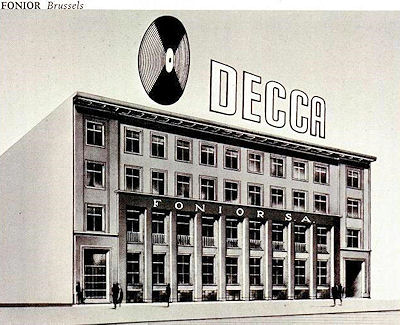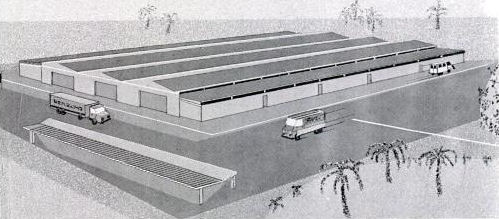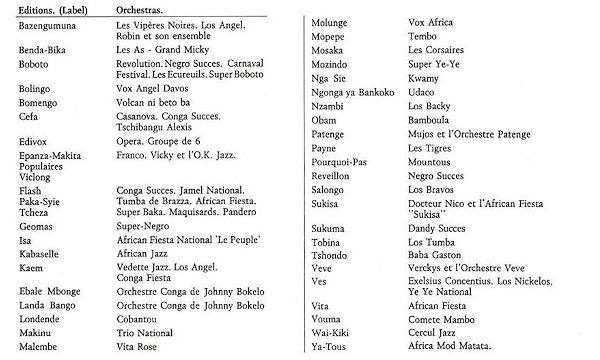Fonior / Decca France
The Belgian Fonior company was founded in 1929 by E.W. Pilgrims de Bigard a year after he opened his first gramophone shop in Brussels. In 1934 Fonior formed a production and distribution partnership with the British Decca company which, after WWII even included Holland and France through its sister companies Dureco and Sofrason (Société Française du Son). In 1954-1955 Fonior built a pressing plant (Ecodis) in the Belgian Congo. Besides Belgium and Holland, Fonior also had pressing plants and ran a number of labels in France including Decca, Vega, African and Fiesta. In 1973 Fonior / Decca France was incorporated into the holding company the International Pelgrims Group (IPG).

Fiesta – 78 rpm shellac discs
The Fiesta label for 78 rpm shellac discs was initiated in 1947 and was Fonior / Decca France’s first attempt to enter the African record market. At the outset it specialized in artists from North Africa with Ahmed Hachelef as artistic director. Around 1950 the label also began to record artists from France’s Sub-Saharan colonies Senegal, Soudan (Mali), Guinea, Côte d’Ivoire, Togo, Dahomey (Bénin), Cameroun and Congo.
Given Fonior’s partnership with Decca in Great Britain and the geographical limitations found in British Decca’s West African series, only to include artists from Britain’s West African colonies, a quiet understanding seems to have been reached between British Decca and Fonior / Decca France not to compete against each other on the African record market. Seen from this perspective one could see the Fiesta shellac label as a parallel to Decca’s WA/GWA/NWA series.
But in the early 1950s the Fiesta label soon found itself in stiff competition on the African market with new series introduced by several other French labels Le Chant du Monde, Africavox, Pathé , Philips (France) and the Congolese based Ngoma and Opika labels. By the mid-1950s Fiesta seem to have given up on releasing any new recordings with Sub-Saharan artists.

Ecodis, Kinshasa – artist’s impression
Special Industry Profile sponsored by Fonior
Billboad (New York, N.Y.), 6 June 1970, page 51 (excerpt)
Surboum Africaine – series history
The Surboum Africaine series was released from 1961 to 1979 by Fonior / Decca France and continued by SonoDisc from 1982 to 1998 and included 3 labels: Decca, African and Fiesta.
During the first months of 1960 singer and bandleader Joseph Kabassele “Gran Kallé” and a select line-up of his band African Jazz were invited to Brussels to entertain the Congolese delegation at the round table conference which led to independence for the Belgian Congo on 30th June 1960. While in Brussels the band also went into a studio and made several recordings which were released on Joseph Kabassele’s newly established record label Surboum Africaine Jazz, the first record label (in French “édition”) to be owned by a Congolese.
Fonior’s Surboum Africaine series was based on re-releases selected from Joseph Kabasselle’s Surboum African Jazz label. Initially the series only featured recordings by African Jazz and O.K. Jazz whom Joseph Kabasselle had invited to use his new label after O.K. Jazz had left the Congolese Loningisa label in 1961. Eventually Fonior’s Surboum Africaine series also included recordings with Les Bantous and O.K. Jazz from the CEFA label which by now was owned by Ecodis, Fonior’s Congolese pressing plant. By the mid-1960s the series also included recordings made for Roger Izeidi’s Congolese Vita, Tcheza, Flash and Paka-Siye labels and various other labels associated with Ecodis. The Surboum Africaine series was primarily manufactured for the former French colonies in Africa and for the European market whereas Ecodis, with a manufacturing capacity of more than a million discs a year, catered for the Congolese market. By 1973 when the formation of the IPG Group was announced Ecodis’ capacity was given as 2 million discs annually.
Decca label – compact 33 tours – super 45 tours – 45 tours
The Surboum Africaine series was released from 1961 to 1965 as 41 individually numbered EPs (Surboum African Jazz N° 1 – 41) on the Decca label in the “variétés internationales” 243.000, 451.000 and 460.000 series. N° 1 – 5 as compact 33 tours (33 rpm EPs) and N° 5 – 41 as super 45 tours (45 rpm EPs), i.e. with N° 5 released in both formats and N° 4 and N° 6 with identical tracks. Parallel to the EPs, 49 Surboum Africaine 45 tours (45 rpm) singles (given individuel “series names” depending on the band) were released from 1962 to 1965 in the Decca 70.000 into the 71.000 series (another of Decca’s “variétés internationales” series where the Congolese artists appeared alongside Los Machucambos, Caterina Valente, Fernandel, etc).

Decca super 45 tours (45 rpm EPs) – front covers for the Surboum Africaine 451.000 and 460.000 series
African label – 45 tours
In 1966 Fonior / Decca France introduced the African label and the 45 tours (45 rpm) 90.000 / 91.000 single series as a continuation of their Surboum Africaine series for Congolese music on the Decca label (i.e. with a few exceptions allowing for African artists from other countries as well). The design of the cover for the African releases even resembled the Surboum Africaine design for the Decca label for the first 400 or so singles, while the name Surboum Africaine was printed on the labels on the first 600 or so releases on the African label. From 1966 to 1978 some 1,620 singles were released in the African 90.000 / 91.000 series before the series and the 45 tours (45 rpm) single format was given up in favour of the more popular 33 tours (33 rpm) album format. Presumably 5 series numbers were never used (90.554, 90.658, 90.768, 91.455 and 91.493).

African 45 tours (45 rpm singles) – genric front covers for the Surboum Africane 90.000 series
Fiesta label – 45 tours
In 1969 Fonior / Decca France revitalised the Fiesta label with a 51.000 series as a parallel 45 tours (45 rpm) series for both Congolese and a wider range of African artists. The number of new Fiesta releases declined by the mid-1970s and the last release in the series came in 1979. In all some 300 45 tours (45 rpm) discs were released in the Fiesta 51.000 singles series.
African and Fiesta labels – the 360.000 album series
Fonior / Decca France introduced the African label’s 33 tours (33 rpm) 360.000 album series in 1966. In the 1970s the 360.000 series also included a number of releases on the Fiesta label. The African label was – with a few exceptions – used for compilation albums based on 45 tours (45 rpm) singles originally released in the Congo (by now renamed Zaïre), whereas the Fiesta label was used principally for original or re-released albums by non-Congolese artists. Some of the series numbers were never used (360.030, 360.037, 360.038, 360.113 and 360.133 to 360.139). In all 123 albums (including 5 double albums) were released on the African and Fiesta labels in the 360.000 series up until 1979, before Decca France and the International Pelgrims Group were declared bancrupt in March 1980.
SonoDisc
The International Pelgrims Group’s catalogue with African music – including the African and Fiesta labels – was purchased by SonoDisc based in Paris, which by now had become the largest distributor of African music in Europe. SonoDisc continued the 360.000 album series in 1982, first by re-pressings of the existing catalogue, and from 1984 to 1987 by adding another 28 new vinyl compilation albums with Congolese music to the series (African 360.140 to 360.168). Between 1991 and 1998 SonoDisc re-arranged the entire Congolese vinyl catalogue on 103 CDs on the African label in the 36500 series – much to the irritation of collectors.
SonoDisc merged with the Musisoft Next Group in 1998. When the company went into liquidation in 2005 it was bought by The Adageo group which began re-releasing SonoDisc’s Congolese CD catalogue on the Suave label in 2006 with new series numbers. The company changed its name in 2011 to The Sonodisc Group and went online with a website the following year. LINK
Over the years, tracks that first appeared outside Africa in the Surboum Africaine series on the Decca, African and Fiesta labels have also been re-released on compilation albums produced by many other companies.
Decca 258.000 & 278.000 series and Fiesta 362.000 & 366.000 series
Fonior’s close ties to Decca in Great Britain and Decca’s branch based in Lagos Nigeria gave direct access to Decca’s West African catalogue of which a small part was re-released on the Decca label in France in the 258.000, and 278.000 series (e.g. Ebenezer Obey, Ikenga Super Stars of Africa, Prince Nico Mbarga, Fela Anikulapo Kuti). The Fiesta label’s 362.000 series focused on original albums releases by Cameroonian artists (e.g. André Marie Tala, Kemayo and Manu Dibango) whereas the Fiesta 366.000 series featured salsa artists and music from Côte d’Ivoïre and the Central African Republic.
Historical legacy
Together with the Congolese Ngoma label’s French vinyl releases (1960-1971) and Pathé-Marconi EMI’s French releases of Congolese music (1960-1979), it was the Surboum Africaine series above all on the Decca, African and Fiesta labels from 1961 to 1980 that introduced African popular music to a French and wider international audience. Already by the late 1960s there were signs of things to come when Congolese music was complemented with the first vinyl releases in France of Guinean music on the Syliphone label and Cameroonian music on the Africambiance and Les Disques Samson labels, which again opened the market for further releases in the 1970s of albums with Ghanaian, Nigerian, Malian, Senegalese and Kenyan music and eventually the international exposure of the entire African music scene we know today. In hindsight the Surboum Africaine series provided an essential introduction to what years later should be labeled world music.
Discographical notes
Vega, another of Fonior’s labels in France, released two compilation albums with Congolese music in 1967 and 1969 respectively (Vega 19.101 and Vega 19.148) with the title African Party Vol. 1 and Vol. 2. Both albums were later re-released on the African label as 360.089 and 360.090.
Tabu Ley’s two albums Rochereau à l’Olympia were originally released on the African label as R101 and R102 and re-released as African 360.028 and 360.029.
Two albums by Kalle et l’African Team (African 360.021) Vol. 2 and (African 360.022) Vol. 3 were also re-released once more on the African label as African 360.088 and 360.087 respectively.
Congolese labels (editions) associated with Fonior’s Ecodis pressing plant

Special Industry Profile sponsored by Fonior
Billboad (New York, N.Y.), 6 June 1970, page 51 (excerpt)
Page created 31/08/2013 Flemming Harrev – latest update 05/07/2015
